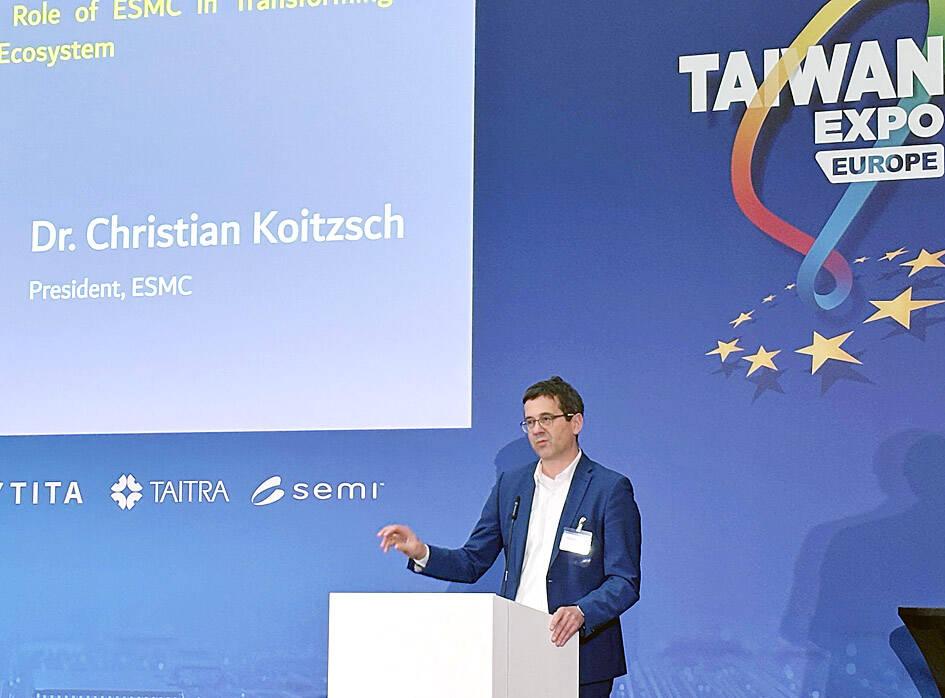European Semiconductor Manufacturing Co (ESMC), a subsidiary of contract chipmaker Taiwan Semiconductor Manufacturing Co (TSMC, 台積電), will hire almost 2,000, from Germany and other European countries, ESMC president Christian Koitzsch said on Monday.
At the Taiwan-Europe semiconductor cooperation forum in Berlin, Koitzsch said ESMC would utilize TSMC’s advanced technologies, talent in Europe and good work ethic in Germany to build a world-class talent pool for the semiconductor industry.
In August last year, TSMC announced it would team up with Robert Bosch GmbH, Infineon Technologies AG and NXP Semiconductors NV to set up ESMC, in which the Taiwanese partner would hold a 70 percent stake and the three foreign partners would own the remaining 30 percent.

Photo: CNA
The joint venture is scheduled to break ground on a 12-inch wafer fab in Dresden, the capital city of Saxony, in the second half of this year with mass production slated to start at the end of 2027, using TSMC’s 12 nanometer, 16nm, 22nm and 28nm processes for the production of automotive electronics and specialty industrial devices.
In addition to the large recruitment campaign, TSMC will dispatch hundreds of engineers to Dresden over the next three to five years to boost exchanges with ESMC, Koitzsch said.
Koitzsch, a physicist, switched jobs earlier this year to become the head of ESMC after holding different roles at Bosch and had headed the company’s Dresden Bosch plant since July 2021.
The ESMC president said his company will send its employees to Taiwan for training to better understand how the wafer fab will operate, which is expected to improve the new Dresden facility’s operational efficiency and eventually help to build a semiconductor ecosystem in Germany.
According to Koitzsch, ESMC’s clean room will have an area of about 45,000 square meters, while the facility’s economies of scale are expected to cut operating costs, strengthen competitiveness, and create tremendous job opportunities in the supply chain.
Koitzsch said ESMC’s new plant will apply to a wide range of green technologies so that the facility’s water consumption will be about 50 percent of the industry’s average and power consumption by every 1 square centimeter silicon chip will be about 60 percent of the industrial average.
Koitzsch added that the new fab is expected to roll out about 480,000 12-inch wafers a year to boost Germany’s share in the global market.
While EMSC is planning to build a large talent pool, Torsten Thieme, an advisor with Silicon Saxony, said unions in Germany always take a hardline stance to employers and that’s one of the challenges TSMC has to conquer.
With more than 500 members, Silicon Saxony is the largest high-tech network in Saxony, one of the largest information and communications technology clusters in Germany and microelectronics clusters in Europe, the organization said on its Web site.
In the wake of a labor shortage, TSMC needs to come up with competitive compensation to attract production line workers and engineers to work for ESMC, Thieme said.
Wolfgang Weber, CEO of ZVEI (the German Electro and Digital Industry Association), said as it is three years away from mass production of ESMC’s new facility in Dresden in 2027, TSMC still has time to work with the academy and government agencies to cultivate talent.
Weber said he knew Taiwanese people worked very hard and long hours but it is unlikely to request workers in Germany to work 50 hours a week.

Macronix International Co (旺宏), the world’s biggest NOR flash memory supplier, yesterday said it would spend NT$22 billion (US$699.1 million) on capacity expansion this year to increase its production of mid-to-low-density memory chips as the world’s major memorychip suppliers are phasing out the market. The company said its planned capital expenditures are about 11 times higher than the NT$1.8 billion it spent on new facilities and equipment last year. A majority of this year’s outlay would be allocated to step up capacity of multi-level cell (MLC) NAND flash memory chips, which are used in embedded multimedia cards (eMMC), a managed

CULPRITS: Factors that affected the slip included falling global crude oil prices, wait-and-see consumer attitudes due to US tariffs and a different Lunar New Year holiday schedule Taiwan’s retail sales ended a nine-year growth streak last year, slipping 0.2 percent from a year earlier as uncertainty over US tariff policies affected demand for durable goods, data released on Friday by the Ministry of Economic Affairs showed. Last year’s retail sales totaled NT$4.84 trillion (US$153.27 billion), down about NT$9.5 billion, or 0.2 percent, from 2024. Despite the decline, the figure was still the second-highest annual sales total on record. Ministry statistics department deputy head Chen Yu-fang (陳玉芳) said sales of cars, motorcycles and related products, which accounted for 17.4 percent of total retail rales last year, fell NT$68.1 billion, or

In the wake of strong global demand for AI applications, Taiwan’s export-oriented economy accelerated with the composite index of economic indicators flashing the first “red” light in December for one year, indicating the economy is in booming mode, the National Development Council (NDC) said yesterday. Moreover, the index of leading indicators, which gauges the potential state of the economy over the next six months, also moved higher in December amid growing optimism over the outlook, the NDC said. In December, the index of economic indicators rose one point from a month earlier to 38, at the lower end of the “red” light.

MediaTek Inc (聯發科) shares yesterday notched their best two-day rally on record, as investors flock to the Taiwanese chip designer on excitement over its tie-up with Google. The Taipei-listed stock jumped 8.59 percent, capping a two-session surge of 19 percent and closing at a fresh all-time high of NT$1,770. That extended a two-month rally on growing awareness of MediaTek’s work on Google’s tensor processing units (TPUs), which are chips used in artificial intelligence (AI) applications. It also highlights how fund managers faced with single-stock limits on their holding of market titan Taiwan Semiconductor Manufacturing Co (TSMC, 台積電) are diversifying into other AI-related firms.